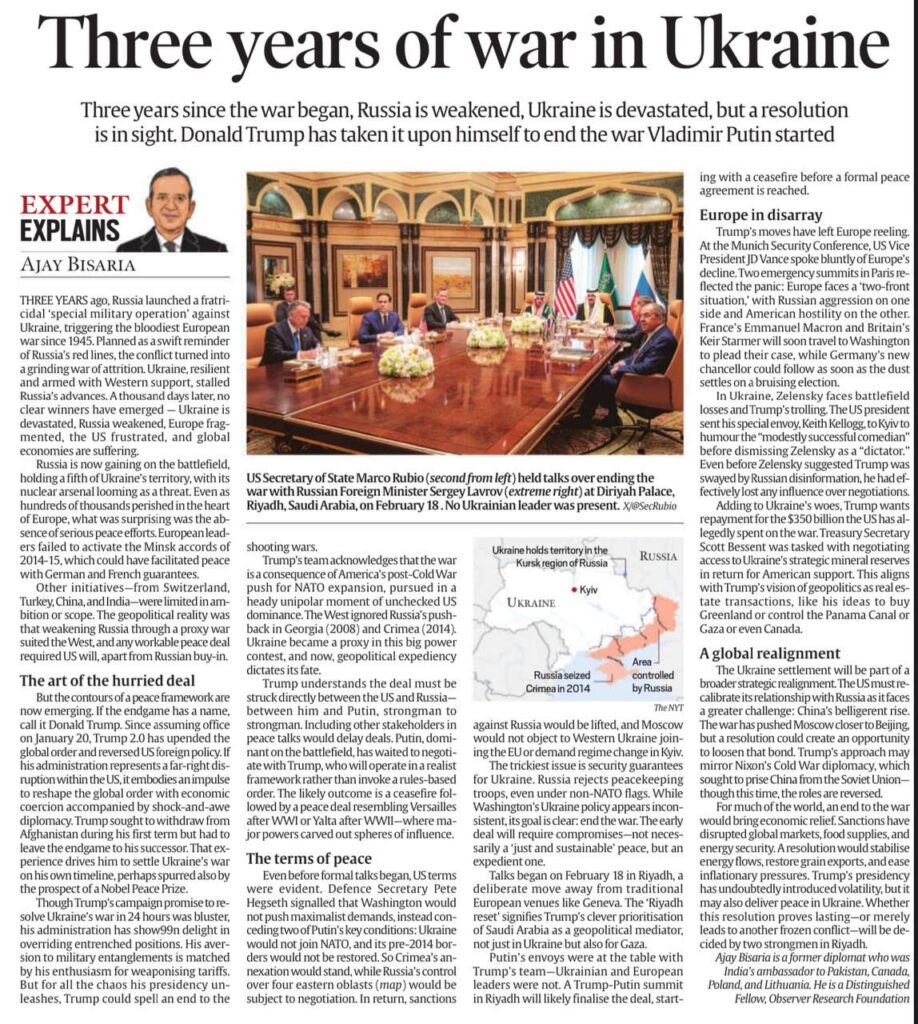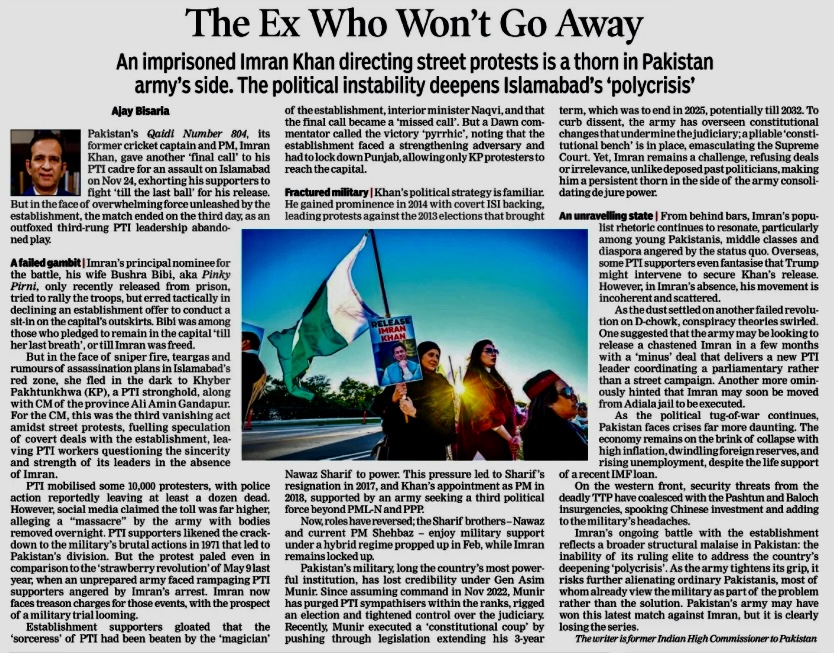ANI: India-Canada relations likely to improve post-Trudeau era: Former High Commissioner Ajay Bisaria
India-Canada relations likely to improve post-Trudeau era: Former High Commissioner Ajay Bisaria New Delhi [India], March 18 (ANI): Former High Commissioner of India to Canada Ajay Bisaria expressed optimism about the future of India-Canada relations, stating that a change in leadership in Canada could create an opportunity to mend diplomatic ties. He noted that the […]
Managing a Tough Neighbourhood
India’s neighbourhood policy demands strategic patience, embracing occasional anti-India regimes, navigating Chinese competition, and rejecting zero-sum approaches. A durable framework for regional security and prosperity should prioritize grants over loans, emphasizing economic and security cooperation, connectivity, and humanitarian assistance. Engagement spans energy collaboration, development aid, defence partnerships, disaster relief, cultural exchanges, and infrastructure projects. Encouraging Quad partners like the U.S., Japan, and Australia to join South Asia’s economic initiatives will enhance regional stability, despite occasional differences. Reviving SAARC will offer a more manageable mechanism for dialogue, complementing sub-regional platforms like BIMSTEC and BBIN, while reducing reliance on the China-led SCO.
Three Years of War in Ukraine

Trump understands the deal must be struck directly between the US and Russia—between him and Putin, strongman to strongman. Including other stakeholders in peace talks would delay deals. Putin, dominant on the battlefield, has waited to negotiate with Trump, who will operate in a realist framework rather than invoke a rules-based order. The likely outcome is a ceasefire followed by a peace deal resembling Versailles after WWI or Yalta after WWII—where major powers carved out spheres of influence.
Book Excerpt: Essays in Mutual Comprehension
Manmohan Singh added poetically that this meeting was ‘an essay in mutual comprehension’ and that the two leaders would together write a new chapter in the history of the two countries. Musharraf presented Singh a painting of the school in Gah village (now in Pakistan), the Indian PM’s birthplace, and where he had had his initial schooling. On his part Singh again recited the Urdu couplets which he had read out to Musharraf in their phone conversation.
12/13 The Parliament Attack
That afternoon, a group of officers from the PM’s security, the SPG, came in to my office. They were convinced that the PM was the primary target of the assault and thanked me for my fortuitous morning intervention. Our obsession in the PMO on ‘no pendency’ had prevented the prime minister’s carcade from crossing paths with the terrorists. Five days later, Home Minister Advani would confirm that ‘the terrorist assault on the very bastion of our democracy was clearly aimed at wiping out the country’s top political leadership.’
The Ex Who Won’t Go Away

An imprisoned Imran Khan directing street protests is a thorn in Pakistan army’s side. The political instability deepens Islamabad’s ‘polycrisis’. Pakistan’s Qaidi Number 804, its former cricket captain and PM, Imran Khan, gave another ʻfinal callʼ to his PTI cadre for an assault on Islamabad on Nov 24, exhorting his supporters to ‘fight till the […]
The Print: Pakistan foreign minister was in Delhi on 26/11. India’s only ‘retribution’ was expelling him
With telling revelations, memoir, and account of history, Ajay Bisaria’s Anger Management is a study of the diplomatic engagement between India and Pakistan.
Book Excerpt: Massacre in Mumbai
President Zardari called PM Manmohan Singh on the morning of 27 November to condemn the attacks and surprisingly, promised to send the DG of the ISI, Shuja Pasha, to help in the investigation. On the evening of 27 November, just before Qureshi addressed a group of journalists at the Women’s Press Club in New Delhi, Shahid Malik’s phone buzzed.
Book Excerpt: A Grab at Kashmir
The 1965 war was born of 1962, which left us looking like bumblers…. We foiled Pakistan’s resulting adventure, doubtless an achievement, albeit limited, but it turned Pakistan to other means: fomenting dissidence in our Punjab, feeding subversion elsewhere, developing terror as an instrument of policy, apart from making life difficult in J&K, while scheming its way to nuclear power. All comprehensively demonstrating an undying obsession—doing India down, wresting J&K.
Dealing with Pakistan: India’s Western Neighbour is No Longer a Strategic Priority
India’s Pakistan policy has evolved over the last decade, from an attempted rapprochement in 2014-15, to a focus on stringent border management and counterterrorism. Even though India’s primary strategic challenge over the next decade would emanate from the north i.e. China- the country’s most recalcitrant western neighbour will continue to pose a sub-conventional security threat.